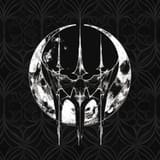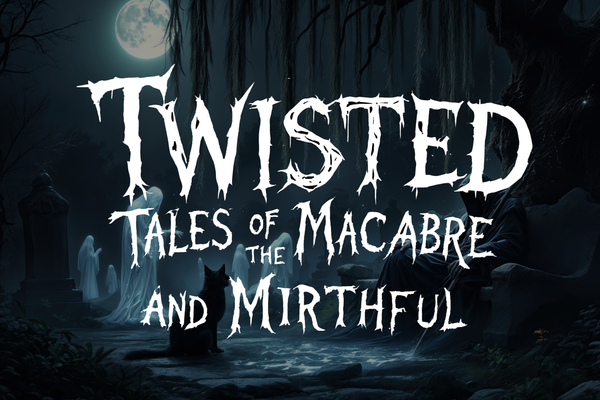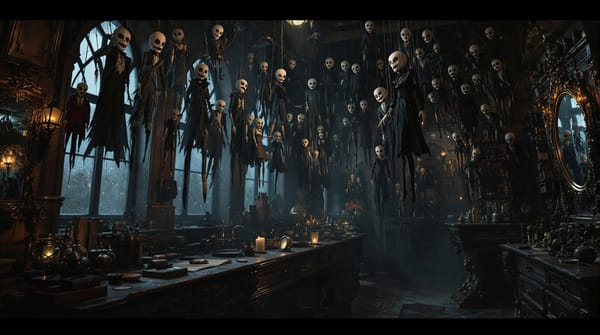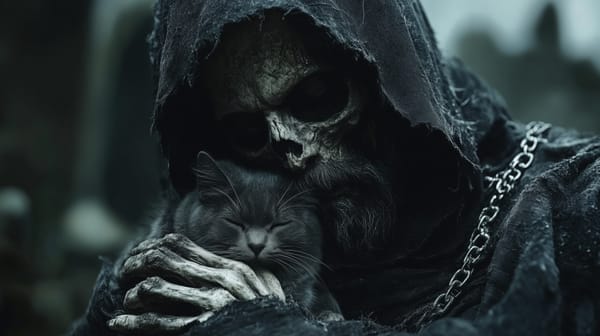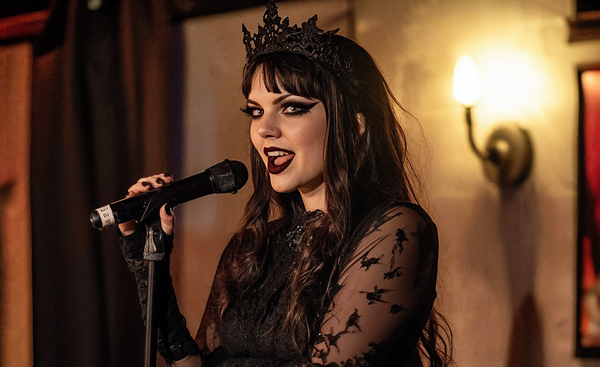The Glass Shatters: The Untold Story of Transcendant's Lost Voice

In the shadowy corners of Ravenfall's music scene, there's a story that's been whispered about for years—the tumultuous tale of Simon Glass and Evelyn Duskfall, two powerhouse personalities whose explosive collaboration (and equally explosive breakup) would ultimately shape what would become Transcendant. Some say on certain nights, when the moon hangs heavy over the Orpheum Theater, you can still hear echoes of their legendary arguments reverberating through its ancient walls.
Before the ethereal keyboards of Jane Frost, before Rachael Nightshade's haunting bass lines, and before Raven's guitar work painted darkness in sound, there was a different vision for what would become Ravenfall's most enigmatic band. It centered around the undeniable chemistry between Evelyn Duskfall, the aristocrat-turned-drummer with a rebellious streak, and Simon Glass, a post-grunge vocalist whose raw, powerful voice seemed to tear emotions straight from the void.
“The energy between them was electric,” remembers local venue owner Marcus Thorne, his eyes distant as he recalls those early days. “When they performed together, it was like watching a storm build. You never knew if you were about to witness something magnificent or if the whole place was going to burn down. Usually, it was both.”

The Beginning of the Storm
Their musical partnership began in the winter of 2019, when Glass, fresh from touring with his previous band The Shallow Graves, returned to Ravenfall. Their first meeting at the infamous Coffin & Cauldron club has become something of local legend—Evelyn, holding court at her usual corner table, draped in Victorian gothic splendor that somehow managed to look both regal and rebellious, and Simon, fresh off stage from a solo performance that had left the audience breathless, his voice still echoing in the rafters.
“I remember that night like it was carved into my bones,” says longtime Coffin & Cauldron bartender Claire Blackwood (no relation to Raven). “The tension in the air was thick enough to cut with a knife. Everyone could feel it—we were watching something powerful begin, even if we didn't know exactly what. The candles flickered wildly when they first spoke, though there wasn't a breeze to be found. In Ravenfall, we tend to notice things like that.”
What followed was six months of intensive collaboration that would become known in local music circles as "The Glass Season." The handful of people who witnessed their early rehearsals speak of music that was raw, powerful, and unlike anything either artist had created before. Their sound merged Glass's post-grunge intensity with Duskfall's gothic sensibilities, creating something that seemed to blur the lines between genres and worlds.
“It was like watching two forces of nature collide,” recalls sound engineer Thomas Rivera. “Simon's voice had this way of tearing through the darkness, while Evelyn's drums were like a heartbeat from some ancient, forgotten god. When they were in sync, it was magic. Real magic, the kind that makes you believe in things you can't explain. But when they clashed...” He shakes his head, leaving the thought unfinished.
Love and Other Natural Disasters
The relationship between Glass and Duskfall quickly became the stuff of local legend. Their public appearances at Ravenfall's various haunts were marked by intense displays of both passion and tension. One night they'd be huddled together at their corner table in the Coffin & Cauldron, writing lyrics on napkins and finishing each other's musical phrases. The next, they'd be having spectacular arguments about creative direction that would send other patrons fleeing for cover.
“They were like fire and gunpowder,” says Regina Mills, owner of the Blackspire Bookshop, where the pair often sought inspiration among the gothic classics. “Both brilliant, both volatile, and both absolutely convinced they were right about everything. It was beautiful to watch, in the same way a lightning storm is beautiful—magnificent but potentially devastating.”
The intensity of their connection spilled into their creative process. Recording sessions at the Orpheum would often stretch into the early hours of the morning, their perfectionism feeding off each other until simple songs became complex symphonies of emotion.
“You could feel the building respond to them,” says Mr. Ironwright, the Orpheum's longtime caretaker. “Those old walls have seen a lot of passion over the years, but something about those two... it was different. The shadows seemed deeper when they were working. The air felt charged, like just before a thunderstorm. Sometimes I swear I could hear their music echoing through the halls even when they weren't playing.”
The Breaking Point
But as with many stories of creative passion, the same intensity that fueled their musical chemistry would ultimately lead to their undoing. Both Glass and Duskfall were accustomed to being the dominant creative force in their respective projects, and neither was willing to cede control to the other.
“They were both right, and they were both wrong,” says producer James Morrison, who worked with the pair during this period. “Each had a brilliant vision for what the music could be, but those visions were increasingly incompatible. Simon wanted to push towards a harder, more aggressive sound, while Evelyn was interested in something more complex, more atmospheric. When you get two people that passionate, that talented, and that stubborn... well, something's got to give.”
The breaking point came during the recording of what was meant to be their debut EP. Sources close to the project say the sessions were marked by increasingly heated arguments about creative direction, with both Glass and Duskfall fighting for control of every note and nuance.
“It was like watching a perfect storm tear itself apart,” remembers one studio technician who asked to remain anonymous. “Their last fight... I've never seen anything like it. The air itself seemed to crackle with electricity. Equipment was malfunctioning, lights were flickering, and the temperature in the Orpheum dropped so low we could see our breath. In Ravenfall, we learn to read the signs, and everything that night was screaming that something momentous and terrible was about to happen.”
The Night Everything Changed
The details of their final confrontation remain shrouded in mystery, though regulars at the Orpheum Theater still talk about the night the building's ancient foundations seemed to shake with the force of their argument. Local legend says that every mirror in the building shattered simultaneously, and that for weeks afterward, strange echoes could be heard in the theater's empty halls—phantom music that sounded like either love songs or funeral dirges, depending on who was listening.
The aftermath was a complex web of legal negotiations, resulting in a settlement that included specific terms about the release of the material they had recorded together. Only two songs were completed before the partnership imploded—two pieces that captured both the passion and the pain of their collaboration.
Echoes of the Past
Now, years later, these two songs are finally seeing the light of day—not as the beginning they were meant to be, but as a glimpse of what might have been. When asked about the upcoming release, Evelyn Duskfall's response is characteristically sharp: "Contractual obligations are contractual obligations, darling. Though I must say, it's rather amusing how the universe insists on dragging up old ghosts. Particularly when one has gone to such lengths to exorcise them."
Simon Glass, now enjoying success with his current project Glass House Empires, was equally diplomatic: "Some fires burn too hot not to leave scars. But sometimes those scars make the most interesting patterns."
The EP, titled Hollow Grove, represents more than just two songs from a failed collaboration. It's a testament to a moment in time when two powerful forces collided in Ravenfall, creating something that was perhaps too intense to last.
“Those recordings capture something special,” says James Morrison. “There's a raw energy there, a kind of magic that doesn't come along often. Whether that magic was creative brilliance or creative destruction... well, sometimes it's hard to tell the difference.”
For Transcendant, these songs represent a chapter of their history that helped shape who they would become, even if it's not a chapter they ever expected to share. For Simon Glass, they're a reminder of a road not taken. And for the rest of us, they're proof that sometimes the most beautiful things can come from moments of chaos and destruction.
The tracks themselves are said to be unlike anything either artist has produced before or since—a unique fusion of Glass's raw emotional power and Duskfall's gothic sensibilities, preserved like insects in amber from a time when their creative energies were perfectly, precariously balanced.
As one Orpheum regular put it: “Some say if you listen carefully, you can hear the exact moment when passion turned to poison. But isn't that what the best gothic romances are made of?”
After all, isn't that what Transcendant has always been about?
The Hollow Grove EP will be released next week through all major streaming platforms. Whether you view it as a historical curiosity, a legal obligation, or a gothic tragedy in musical form may depend on your perspective. But one thing is certain—these songs are a rare glimpse into a moment when two powerful forces collided in Ravenfall, and the echoes of that collision are still reverberating through the town's shadows.
Editor's Note: Multiple attempts were made to photograph Simon Glass and Evelyn Duskfall together during their collaboration period. Curiously, most photographs proved to be either inexplicably overexposed or impossibly dark, as if the camera itself couldn't quite capture what it was seeing. The few images that did survive - before reportedly meeting their end in what locals refer to as "The Duskfall Bonfire" - were said to possess strange qualities: shadows that seemed to move between viewings, mysterious light anomalies, and in some cases, unexplainable alterations to the background of the Orpheum Theater. Local photographers have learned not to question such occurrences in Ravenfall. Rumors persist that a handful of photographs survived both the supernatural disturbances and Evelyn's subsequent purge, though their current whereabouts remain a matter of speculation.

